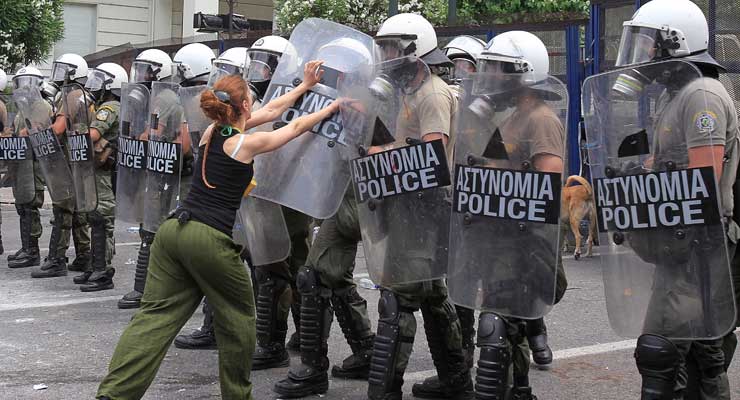
This is part two of a five part series titled, “5 reasons why this society got to go”:
Are you a leftist, rightist, greenist, a democrat or a republican? Or do you perhaps feel a bit tired of all these labels. Must we choose between individualism and collectivism, between capitalism or the state controlling us or serving us? Where did all those categories come from by the way?
The only true good is democracy itself, our right to speak out in the political elections because that’s one of the few occasions in our lives when those in power must turn their focus towards the people and when no one has the right to interfere with your opinion.
The question is if political democracy has the power to make fundamental changes in our society. Is it the will of the people that runs our society?
Has it been the Greek people in control over their future or has it been the banks, the EU and politicians trying to adapt to the “system” and then letting the people pay the bill? Who spread the rumors about lazy Greeks, Greeks that do not work as much as others etc.? News media and editors in northern Europe did so and they were factually wrong!
So who is actually running society one might ask? In school you were told that there are more or less two political directions to choose from. Then, media, politicians and analysts keep this left-right-clash alive. People then adapt just the way they do when they are exposed to commercials. We buy stuff. We do so because we need to survive materially and socially.
What I want to pay attention to is how the world’s institutions have become more bonded, more than ever acting as a “system”. A new power alloy has emerged in a relatively short time, the development of which has received almost no coverage in the newspapers. This has so far escaped the attention of in-depth discussion programs on television and writers on social issues. This alloy was exposed in the Brexit aftermath debates.
This new power alloy has resulted in a regime that forces people to adapt to an increasingly one-track political system; from its ineffective democracy, intensified surveillance presence, to the soporific influence of standardized entertainment and the playing down of signs that all is not well. It is a system that rapidly disconnects people from each other and plugs them into the “network”.
Can political elections have any influence on this alloy? Is our current version of democracy… democratic?
The illusion of democracy is cracking.
Demonstrations, protests and turmoil are surging all over the western world as the view on democracy is changing. Fewer and fewer people buy the old illusion of democracy that we’ve been fed with since we were born.
The truth is that we’re living in a society built on castes, on levels of power, in an old fashioned hierarchical system limited by a framework of assumptions and norms.
That’s why so many people utterly experience their everyday life they were slaves.
Media, politicians, schools and capitalists will never participate in a discussion of this basic nature. Bringing up these matters during the coffee-break at your job will make your colleges feel uncomfortable and so will the other parents when you speak out during a parents-teacher meeting. They keep silent, not necessarily because they would disagree to a system critical opinion. They keep silent because they’re afraid of sticking out.
We live in a society ran by norms and traditions, upheld by an alloy of instances of power that is not very interested in abandoning their caste after all. This caste consists of people that invested their careers, their money and their identities in a system that paid them off.
The political system and democracy should serve the people. Today the system is serving itself, its own existence and the people that are fed by the system. Democracy today has faded away in a cloud of globalized interests. Multinational corporations, intelligence services, banks, authorities, etc. all of which are losing confidence among people.
This is the second reason why this society got to go.
Leave a Reply